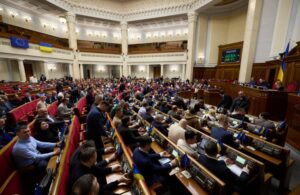
Ukrainian President Volodymyr Zelensky has signed a law recognizing Ukrainian citizens who were forcibly resettled from the territory of the Polish People’s Republic in 1944-1951 as deportees. The relevant law card No. 4540-IX with the signature of the President of Ukraine has been published on the website of the Verkhovna Rada.
Ukrainian Foreign Minister Andriy Sibiga noted that this law restores historical justice regarding this “horrible crime.”
“President of Ukraine Volodymyr Zelenskyy has just signed an important law restoring the memory of Ukrainians forcibly deported from Poland in 1944-1951. This is a correct and dignified step that restores historical justice regarding this horrific crime. I thank the president for supporting this decision, as well as the members of parliament who developed and implemented it,” he wrote on his Facebook page.
The minister noted that “many witnesses of those tragic events have already passed away,” but in order to protect the rights of “those who still live with us and their descendants,” Ukraine guarantees the provision of assistance as provided by law.

Head of business security practice at Juscutum law firm Oleksandr Horobets supported the adopted amendments to the CPC regarding NABU and SAP.
“Instead of political manipulation – legal clarity. Bill No. 12414 for the first time clearly establishes the boundaries of authority and raises the standards of human rights protection,” he said in a comment transmitted to the Interfax-Ukraine news agency on Wednesday.
In his opinion, in the framework of expanding the powers of the Prosecutor General, the law returns the situation to the legal field, because the expansion of the competence of the SAP from January 1, 2024, according to the law №3509-IX, contradicted the norm of the Constitution that the powers of the Prosecutor General can not be transferred to another prosecutor.
“A significant achievement of the draft law is the elimination of the destructive practice of conducting searches without court orders. The draft clearly limits this right exclusively to cases where there is an urgent need to save a person’s life, health, sexual freedom, safety or to preserve evidence of these crimes. This approach is worthy of the highest praise, because it is a direct step towards strengthening the guarantees of protection of the rights and freedoms of Ukrainian citizens from unjustified interference in private life”, – the head of Juscutum’s business security practice is of the opposite opinion to the UBA.
He added that the adopted law also provides a number of additional guarantees for the participants of the proceedings, in particular, the request to extend the pre-trial investigation up to 12 months must now be coordinated personally by the Prosecutor General, and his deputies will not have such a right.
Horobets believes that the adopted law leaves a wide range of legal opportunities for this NABU to work in a civilized and productive manner, and reminds that the expansion of powers of the SAP occurred only from January 1, 2024, and before that this body also worked effectively.
The lawyer also noted that the changes made concern all law enforcement agencies and structures, not only anti-corruption, so we should not talk about selective intervention.
“Bill No. 12414 is not a threat, but an important step towards a more efficient, constitutional and human rights-based justice system in Ukraine. It is designed to eliminate imbalances, strengthen guarantees of citizens’ rights and make the work of law enforcement agencies more transparent and responsible,” summarized the head of Juscutum’s business security practice.

On Wednesday, President of Ukraine Volodymyr Zelenskyy signed a law on taxation of remuneration for gig contracts of Diia.City residents (draft law No. 9319) with an amendment to bring new tax rules (draft law No. 11416d) into force for individual entrepreneurs and legal entities on a single tax from January 1, 2025, said Danylo Hetmantsev, chairman of the parliamentary committee on taxation and customs policy.
“Draft Law 9319 has been signed. The increase for individual entrepreneurs comes into force on January 1. Everything is as promised,” he wrote in his telegram channel.
His deputy Yaroslav Zheleznyak noted that the law had been awaiting the president’s signature for 17 days.
As reported, on November 28, the President of Ukraine signed Law 4015-IX (Bill No. 11416-d) on amendments to the Tax Code regarding the peculiarities of taxation during martial law. The document envisages an increase in the military tax from 1.5% to 5% starting from October 1 this year, a 50% increase in the bank profit tax in 2024, and an increase in a number of other taxes and fees.

The Committee on Legal Policy recommends that the Verkhovna Rada adopt the draft law (No. 9235) on certain issues of disclosure of banking secrecy and measures to establish custody of the property of a missing person, the press service of the Ukrainian parliament’s apparatus reports.
The draft law proposes to amend the Civil Code and the laws “On Notaries”, “On Banks and Banking” and “On the Legal Status of Persons Missing in Special Circumstances”.
The draft law, in particular, defines the procedure for notaries to establish guardianship over the property of an individual who has been declared missing or a person who has gone missing under special circumstances. The draft law expands the list of persons to whom banks may disclose information constituting bank secrecy. In particular, it provides for its disclosure at the request of notaries to perform a notarial act to take measures to establish guardianship over the property of an individual who has been declared missing or a person who has gone missing under special circumstances.
The adoption of the draft law will allow family members of an individual who has been declared missing or missing under special circumstances to receive a notarized certificate of guardianship over the property of such persons. The law will also ensure the protection of the rights and interests of Ukraine in foreign jurisdictions in cases related to compensation for damage caused as a result of an international armed conflict in the country.
On May 23, the Verkhovna Rada adopted in the first reading a draft law amending certain laws on certain issues of disclosure of banking secrecy.

President of Ukraine Volodymyr Zelenskyy has signed the European integration law No. 3928-IX “On Grapes, Wine and Viticulture Products,” the press service of the Verkhovna Rada Committee on Agrarian and Land Policy reports.
According to the report, the law was adopted to bring the norms of sectoral legislation in line with the requirements of international rules for the production of viticulture and winemaking products, as well as to implement the provisions of the European Union’s regulations on viticulture and winemaking, oenological practices, production of flavored wine products, use and protection of geographical indications of wines, flavored wine products, and control in this area.
The document provides for the introduction in Ukraine of requirements for the production and circulation of wines, viticulture and winemaking products, and flavored wine products with geographical indications similar to current rules in the EU.
In addition, the law provides for the definition of a mechanism for the protection of geographical indications in Ukraine, the introduction of new terms and definitions in accordance with the categories of European legislation, and the implementation of the rule on labeling and presentation of wine products.
The document establishes the principles for conducting inspections of wine production from the vineyard to the final product, defines controlling institutions and their powers, and specifies sanctions for violations of the requirements established by law.
Ukraine will create a unified state information system, the Viticulture and Winemaking Register, and provide for the possibility of state support for viticulture and winemaking.
It is expected that the law will help provide citizens with high-quality products produced in accordance with international rules with special properties due to the natural conditions of the territory of origin. New jobs and favorable conditions for the development of business entities of all forms of ownership will be created in rural areas.
The law will come into force on January 1, 2026.

A revised draft law on tax increases during wartime (No. 11416-d) was registered in the Verkhovna Rada on Friday, the parliament’s website reports.
The text of the draft law on amendments to the Tax Code of Ukraine regarding the peculiarities of taxation during martial law is not yet available on the website.
The draft law is authored by MPs Danylo Hetmantsev and Andriy Motovylovets (Servant of the People faction) and Oleksandr Lukashev (Restoration of Ukraine parliamentary group).
As reported, the Parliamentary Committee on Finance, Taxation and Customs Policy recommended that the Verkhovna Rada adopt as a basis the revised draft law on raising tax rates.
According to Committee Chairman Hetmantsev, the draft law provides for an increase in the military tax rate from 1.5% to 5%, setting the military tax at 1% of income for individual entrepreneurs (IEs) for single tax payers of group III and at 10% of the minimum wage for single tax payers of groups I, II and IV.
LAW, PARLIAMENT, TAX